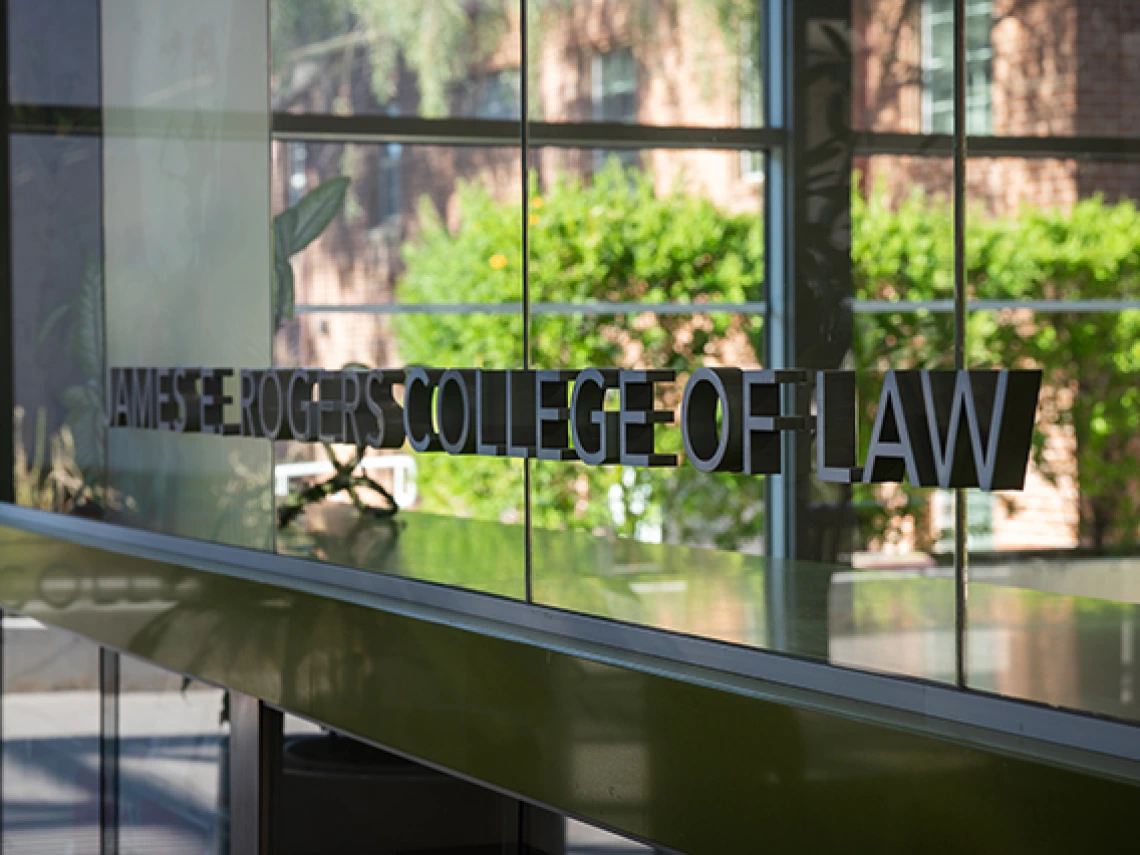For the Record: Awards, Presentations and Expert Insights on Title IX, Tribal Law, Environmental Law and More
Catch up on recent University of Arizona Law faculty accomplishments

News
Puig Wins Edited Volume Book of the Year Award and Publishes in Georgetown Law
Evo DeConcini Professor of Law Sergio Puig’s book, Latin American International Law in the 21st Century, has won the 2025 Edited Volume Book of the Year Award from the American Branch of the International Law Association for the best edited volume on a topic in international law.
Puig’s new co-authored scholarship, “The US-Ukraine Strategic Minerals Partnership in the Wake of Russia’s War of Aggression,” will be published in the American Journal of International Law.
Tsosie Article Publishes in UCLA Law Review
In August, Regents Professor and Morris K. Udall Professor of Law Rebecca Tsosie and Michael Kotutwa Johnson, assistant specialist at the Indigenous Resiliency Center at the School of Natural Resources and the Environment at the University of Arizona, co-authored “The Seed is the Law: Creating New Governance Frameworks for Indigenous Heirloom Seeds and Traditional Knowledge," in the UCLA Law Review.
The article critiques the limits of the 2024 U.N. treaty on intellectual property, genetic resources and traditional knowledge. Tsosie and Johnson argue that while the treaty marks progress, it does not fully safeguard Indigenous peoples’ rights to their heirloom seeds and the cultural knowledge tied to them.
Their research was also featured in articles by the Indigenous Resilience Center and the University of Arizona Office of Research and Partnerships.
Sklar Presents at Arizona Society of Healthcare Attorneys Annual Conference and at the 12th Annual Tribal Summit
On September 19, Faculty Director of the Health Law & Policy Program Tara Sklar presented at the 2025 Arizona Society of Healthcare Attorneys Annual Meeting and Conference. She co-presented, “AI in Law and Medicine: Legal and Ethical Considerations,” with Professor Gary Marchant. They explored how artificial intelligence is reshaping both the legal and healthcare fields. Marchant addressed the ethical and professional responsibility issues lawyers face when incorporating AI tools into legal practice and Sklar highlighted emerging uses of AI in healthcare delivery and the critical legal and regulatory considerations attorneys advising health care clients need to understand.
On September 24, Sklar presented at the 12th Annual Tribal Summit: Listening, Learning, and Strengthening Tribal Healthcare Connections. Her presentation, “Navigating Federal and State Telehealth Policies Affecting Tribal Healthcare,” shared a comprehensive comparison of federal and Arizona telehealth policies, highlighting key developments in cross-state practice, reimbursement parity, and documentation standards amid increasing oversight impacting patient access and provider accountability.
Media
Title IX's effectiveness in addressing campus sexual assault is at risk − a law professor explains why
The Conversation
September 23, 2025
Tammi Walker, associate professor of law and psychology, writes that what is happening to Title IX “isn’t just another policy shift — it’s a dismantling of protections many assume still exist.”
How Trump policies could help, hurt Southern Arizona mining project
Arizona Daily Star
Septmeber 21, 2025
The U.S. Geological Survey announced plans late last month to add copper and silver to the list of minerals considered essential for U.S. economic or national security but highly vulnerable to supply-chain disruptions. However, Trump administration tariffs and an energy policy opposed to renewable sources could force domestic mining operations such as the Hermosa Project in the Patagonia Mountains to export much of what they extract. Professor Justin Pidot, co-director of the Environmental Law Program, is interviewed.
Weekend Law: Judges threatened and tribal sacred sites
Bloomberg Law
September 20, 2025
Associate Clinical Professor Heather Whiteman Runs Him, director of the Tribal Justice Clinic, discusses the Western Apaches’ fight to save sacred tribal lands from mining.
Tribal suits over sacred sites and EPA
Bloomberg Law
September 15, 2025
Associate Clinical Professor Heather Whiteman Runs Him, director of the Tribal Justice Clinic, discusses how tribal suits over sacred sites expose unequal treatment in U.S. courts.
How We Wrote About the Administrative Law Revolution While It Was (and Still Is) Occurring
Verdict
September 8, 2025
Earlier this year, Professors Shalev Roisman and Oren Tamir published in the Michigan Law Review, “Pictures of a Revolution: Administrative Law in a Time of Change,” a review of administrative law casebook supplements after the 2023–24 Supreme Court term. The article became the model for the short piece written in Verdict.
House Natural Resources Committee holds hearing on another ill-conceived permitting reform bill
Legal Planet
September 7, 2025
Professor of Law Justin Pidot, co-director of the University of Arizona Environmental Law, Science and Policy Program, writes in opposition to the proposed Standardizing Permitting and Expediting Economic Development Act. The SPEED Act would reverse many of the provisions of the National Environmental Policy Act, a 1969 U.S. federal law that requires federal agencies to consider the environmental impacts of proposed major actions before implementing them.
Tribal suits over sacred site show religious law shortcomings
Bloomberg Law
September 2, 2025
Years-long court challenges attempting to stop the federal government’s transfer of sacred tribal land in Arizona to a copper mining company show how U.S. religious protections haven’t been equally applied, academics and attorneys say. Heather Whiteman Runs Him, director of the Tribal Justice Clinic at the University of Arizona, is interviewed.
The News Hour: California farms face pressure to boost efficiency as water supply declines
PBS
August 26, 2025
Experts say the demand for water from the Colorado River is of paramount importance out West and it’s been especially critical for farming and agriculture. University of Arizona Law Regents Professor Robert Glennon is interviewed.
